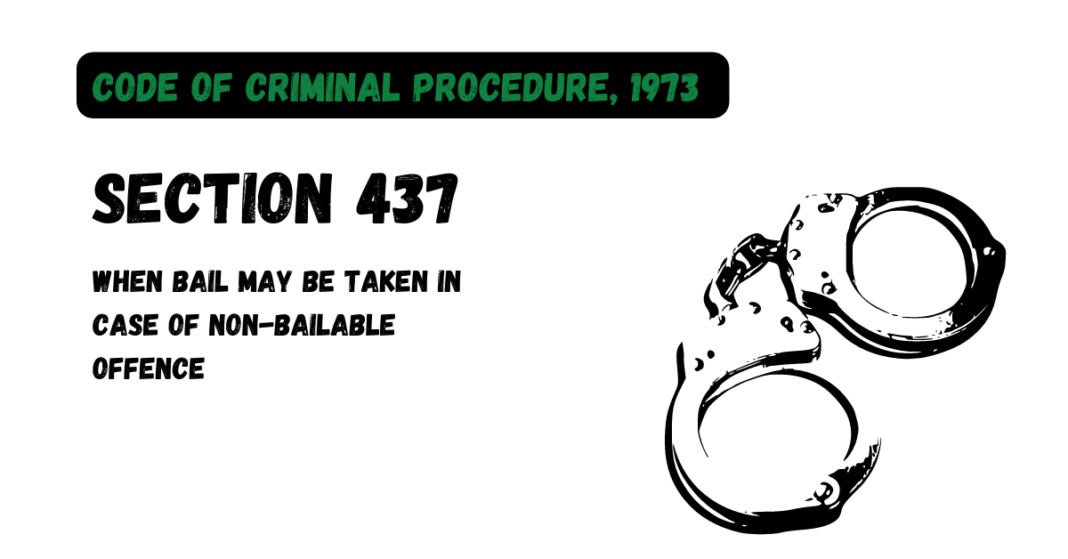(1) When any person accused of, or suspected of, the commission of any non-bailable offence is arrested or detained without warrant by an officer in charge of a police station or appears or is brought before a Court other than the High Court or Court of session, he may be released on bail, but—
(i) such person shall not be so released if there appear reasonable grounds for believing that he has been guilty of an offence punishable with death or imprisonment for life;
(ii) such person shall not be so released if such offence is a cognizable offence and he had been previously convicted of an offence punishable with death, imprisonment for life or imprisonment for seven years or more, or he had been previously convicted on two or more occasions of a cognizable offence punishable with imprisonment for three years or more but not less than seven years:
Provided that the Court may direct that a person referred to in clause (i) or clause (ii) be released on bail if such person is under the age of sixteen years or is a woman or is sick or infirm:
Provided further that the Court may also direct that a person referred to in clause (ii) be released on bail if it is satisfied that it is just and proper so to do for any other special reason:
Provided also that the mere fact that an accused person may be required for being identified by witnesses during investigation shall not be sufficient ground for refusing to grant bail if he is otherwise entitled to be released on bail and gives an undertaking that he shall comply with such directions as may be given by the Court:
Provided also that no person shall, if the offence alleged to have been committed by him is punishable with death, imprisonment for life, or imprisonment for seven years or more, be released on bail by the Court under this sub-section without giving an opportunity of hearing to the Public Prosecutor.
(2) If it appears to such officer or Court at any stage of the investigation, inquiry or trial, as the case may be, that there are not reasonable grounds for believing that the accused has committed a non-bailable offence, but that there are sufficient grounds for further inquiry into his guilt, the accused shall, subject to the provisions of section 446A and pending such inquiry, be released on bail, or, at the discretion of such officer or Court, on the execution by him of a bond without sureties for his appearance as hereinafter provided.
(3) When a person accused or suspected of the commission of an offence punishable with imprisonment which may extend to seven years or more or of an offence under Chapter VI, Chapter XVI or Chapter XVII of the Indian Penal Code (45 of 1860) or abatement of, or conspiracy or attempt to commit, any such offence, is released on bail under sub-section (1), the Court shall impose the conditions,—
(a) that such person shall attend in accordance with the conditions of the bond executed under this Chapter,
(b) that such person shall not commit an offence similar to the offence of which he is accused, or suspected, of the commission of which he is suspected, and
(c) that such person shall not directly or indirectly make any inducement, threat or promise to any person acquainted with the facts of the case so as to dissuade him from disclosing such facts to the Court or to any police officer or tamper with the evidence, and may also impose, in the interests of justice, such other conditions as it considers necessary.
(4) An officer or a Court releasing any person on bail under sub-section (1) or sub-section (2), shall record in writing his or its reasons or special reasons for so doing.
(5) Any Court which has released a person on bail under sub-section (1) or sub-section (2), may, if it considers it necessary so to do, direct that such person be arrested and commit him to custody.
(6) If, in any case triable by a Magistrate, the trial of a person accused of any non-bailable offence is not concluded within a period of sixty days from the first date fixed for taking evidence in the case, such person shall, if he is in custody during the whole of the said period, be released on bail to the satisfaction of the Magistrate, unless for reasons to be recorded in writing, the Magistrate otherwise directs.
(7) If, at any time, after the conclusion of the trial of a person accused of a non-bailable offence and before judgment is delivered, the Court is of opinion that there are reasonable grounds for believing that the accused is not guilty of any such offence, it shall release the accused, if he is in custody, on the execution by him of a bond without sureties for his appearance to hear judgment delivered.





